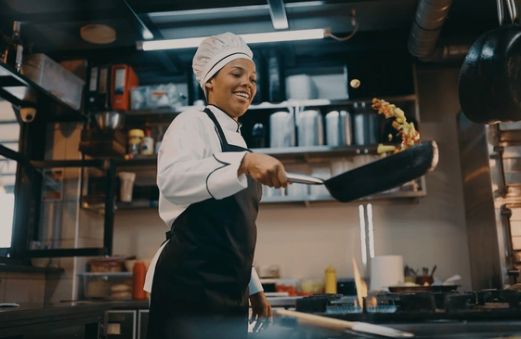
Securing a job as a Cook or Chef requires a strategic approach that goes beyond just culinary skills. This guide aims to provide comprehensive tips for Cooks and Chefs on job offers, covering the essential elements of preparing for a successful culinary career. From crafting an impressive resume to acing interviews and exploring diverse career paths, this guide offers insights into the dynamic and competitive culinary industry.
1. Crafting an Impressive Culinary Resume
a. Highlight Culinary Skills
Begin the resume by showcasing culinary skills and expertise. Emphasize proficiency in various cooking techniques, knowledge of different cuisines, and any specializations, such as pastry or seafood.
b. Detail Culinary Experience
List previous culinary roles, detailing responsibilities, accomplishments, and the types of cuisines or establishments worked in. Use quantifiable achievements to demonstrate the impact made in previous positions.
c. Include Relevant Education and Training
Highlight culinary education, including any culinary school degrees or certifications. Specify additional training programs, workshops, or certifications that contribute to culinary expertise.
d. Showcase Awards and Recognitions
If applicable, include any awards, recognitions, or culinary competitions won. Such achievements add credibility to the resume and capture the attention of potential employers.
2. Preparing for Culinary Interviews
a. Research the Employer
Before the interview, research the prospective employer, understanding their cuisine style, menu, and overall culinary philosophy. This knowledge demonstrates genuine interest and preparedness.
b. Practice Common Interview Questions
Be prepared for common culinary interview questions. Practice responses that highlight culinary skills, problem-solving abilities, and a passion for creating exceptional dining experiences.
c. Demonstrate Adaptability
Culinary roles often require adaptability. Showcase instances where you successfully adapted to changes in the menu, kitchen environment, or unexpected challenges during previous roles.
d. Present a Portfolio of Work
Consider creating a portfolio showcasing images of dishes prepared, menus designed, or events catered. A visual representation of culinary work can leave a lasting impression on interviewers.
3. Showcasing Culinary Skills
a. Create a Culinary Blog or Social Media Presence
Develop a culinary blog or maintain a strong social media presence to showcase culinary creations. This can serve as an online portfolio and demonstrate a passion for sharing culinary experiences.
b. Participate in Culinary Competitions
Engage in culinary competitions to challenge skills, gain exposure, and potentially earn accolades. Participation in reputable competitions can enhance credibility within the culinary community.
c. Offer Tasting Menus or Pop-Up Events
Organize tasting menus or pop-up events to showcase culinary skills to a broader audience. This allows for direct interaction with diners and creates opportunities for word-of-mouth recommendations.
d. Continuously Learn and Experiment
Stay updated on culinary trends, techniques, and ingredients. Experiment with new flavors, cuisines, and cooking methods to demonstrate a commitment to continuous learning and innovation.
4. Networking in the Culinary Industry
a. Join Culinary Associations and Organizations
Become a member of culinary associations and organizations. Attend events, conferences, and workshops to network with peers, chefs, and industry professionals.
b. Engage with Local Food Communities
Participate in local food festivals, farmers’ markets, and community events. Building connections within the local food community can lead to collaborations, job referrals, and exposure.
c. Connect on Professional Networking Platforms
Utilize professional networking platforms such as LinkedIn to connect with chefs, restaurateurs, and industry influencers. Actively engage in discussions, share culinary achievements, and seek mentorship opportunities.
d. Attend Culinary Expos and Trade Shows
Attend culinary expos and trade shows to explore new products, equipment, and industry trends. Networking at these events can open doors to potential job offers and collaborations.
5. Navigating Career Paths in the Culinary Field
a. Explore Different Culinary Settings
Consider exploring diverse culinary settings such as fine dining, casual dining, catering, or private chef services. Each setting offers unique challenges and opportunities for growth.
b. Specialize in a Culinary Niche
Develop expertise in a specific culinary niche, such as vegan cuisine, farm-to-table, or molecular gastronomy. Specialization can set chefs apart and open doors to niche job opportunities.
c. Pursue Culinary Education and Certifications
Continuing education in culinary arts or pursuing specialized certifications can enhance skills and qualifications, making chefs more competitive in the job market.
d. Consider Entrepreneurship
For chefs with a passion for entrepreneurship, exploring opportunities to start a catering business, food truck, or restaurant can be a fulfilling career path. Entrepreneurship offers creative freedom and business ownership.
6. Addressing Challenges in the Culinary Industry
a. Managing Work-Life Balance
The culinary industry often involves long hours and high-pressure environments. Develop strategies to maintain a healthy work-life balance, including time management and self-care practices.
b. Navigating Kitchen Hierarchy
Understand and navigate the hierarchy in the kitchen. Respectful communication, teamwork, and a willingness to learn from experienced chefs contribute to a positive work environment.
c. Staying Updated on Health and Safety Standards
Stay informed about health and safety standards in the kitchen. Adherence to hygiene, sanitation, and food safety protocols is crucial for a successful culinary career.
d. Adapting to Menu Changes and Trends
Embrace adaptability in the face of changing menus and culinary trends. Chefs who can quickly adapt to evolving tastes and preferences are valued in the dynamic culinary landscape.
Conclusion
Becoming a successful Cook or Chef goes beyond mastering culinary techniques; it involves strategic planning, continuous learning, networking, and adapting to the dynamic culinary industry. From crafting an impressive resume to showcasing culinary skills, navigating interviews, and exploring diverse career paths, chefs can build a fulfilling and successful culinary career.
By staying proactive, engaged, and open to new opportunities, Cooks and Chefs can not only secure enticing job offers but also contribute to the evolving culinary landscape. The journey in the culinary field is a culinary adventure filled with growth, challenges, and the opportunity to create memorable dining experiences for patrons around the world.







